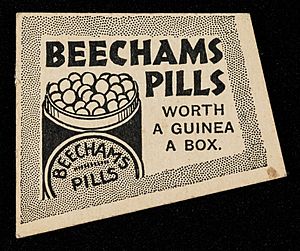Advertising slogan facts for kids
Advertising slogans are short, catchy phrases used by companies to promote their products or ideas. Think of them as a special motto that helps people remember a brand or a product. They are designed to grab your attention and make you think about what a company is selling.
Contents
Where the Word "Slogan" Comes From
The word "slogan" comes from an old Scottish Gaelic word, "sluagh-ghairm." This word meant "army cry" or "battle cry." Today, a slogan is a special advertising phrase used by any group to share its purpose or idea. Other names for slogans include catchphrases or taglines. In the UK, people might call them end lines or straplines. In Japan, they are known as catchcopy or catch phrase.
How Slogans Are Made
Most advertising slogans are short and easy to remember. They are often only three to five words long. Slogans can have different feelings or "tones." For example, a funny slogan can make people laugh and help them remember it better. Slogans often connect all the different ads a company makes, whether they are on TV, online, or in magazines. Sometimes, slogans are used with logos, brand names, or even short songs called jingles.
A Look Back in Time
The slogan "Beechams Pills: Worth a guinea a Box" from August 1859 is thought to be the world's first advertising slogan. It was for a product called Beecham's Pills.
How Slogans Are Used
Some slogans are made to be used for a very long time, helping to build a company's identity. Others are created for shorter, specific ad campaigns. However, if a slogan is really good, people might keep using it even after the company stops promoting it. If a slogan becomes part of everyday talk, more people will learn about the product. This can make an ad campaign last longer or even lead the company to use the slogan permanently.
Slogans that make you feel something, or remind you of memories, are more likely to be remembered and shared. Also, if a slogan connects to something people often talk about (like stress, food, or traffic), people will think of the slogan more often. They will then link the company to their own experiences.
When a slogan becomes popular, it can even change how people talk to each other every day. Slogans can help people connect in a community when they share catchy phrases in conversation. On the other hand, if someone doesn't know a popular slogan, they might feel left out of a discussion.
Are Slogans Really Important?
It can be hard for experts to measure if an ad campaign is truly successful or not. Some people argue that slogans are just a way for companies to feel good about themselves. They say slogans are not memorable or clever enough. However, others believe that if a slogan becomes part of everyday conversations, a company's influence in the market can grow a lot.
What Makes a Good Slogan?
A good marketing slogan helps a company stand out from its rivals. A strong slogan usually:
- Tells you what good things the product or brand offers to people who use it.
- Shows how it is different from other companies' products.
- Is simple, clear, and makes sense.
- Is clever or has a special "personality."
- Gives a believable idea of the brand or product.
- Makes the customer feel an emotion, or creates a need or desire.
- Is hard to forget and sticks in your memory.
The process of creating slogans helps companies show customers the value of their product or service. This is a key part of how businesses attract customers and sell what they offer.
See Also
 In Spanish: Anuncio para niños
In Spanish: Anuncio para niños
- Advertising (Consumerism)
- Consumer confusion
- Impulse buying (Impulse)
- List of slogans
- Media manipulation
- Political slogan
- Promotion (marketing)
- Tagline
- Visual marketing
External articles
- The Advertising Slogan Hall of Fame, www.adslogans.co.uk
- Advertising Industry Guidelines 2014
- Advertising Slogans
 | Toni Morrison |
 | Barack Obama |
 | Martin Luther King Jr. |
 | Ralph Bunche |


